An exclusive feature supported by the LITHUANIAN COUNCIL FOR CULTURE.
Photography by Lina Daugirdaite Lapinskiene for ZEFYR LIFE - Copyrights 2020
Note to readers: This conversation took part on the 13th of January 2020 before the current world Covid 19 Pandemic.
Lina Lapelytė is an artist living and working in London and Vilnius. Her performance-based practice is rooted in music and flirts with pop culture, gender stereotypes, aging and nostalgia. Throughout her career, Lapelytė has explored, crossing genre boundaries while entwining folk rituals with popular music and opera formats, frequently using stylized expression, grotesque and conceptual musicality. She holds a BA in classical violin, a BA in Sound Arts and a MA in Sculpture from the Royal College of Art, London.
Her works Ladies (2015), Hunky Bluff (2014) and Candy Shop (2013/2015) were widely shown in locations including the Serpentine Pavilion and the Queen Elizabeth Hall in London, the Venice Architecture Bienniale and MACBA (Barcelona).
Her first collaborative work with Rugilė Barzdžiukaitė and Vaiva Grainytė, the opera Have a Good Day! premiered in 2013 and has received several awards. Its libretto has been translated into nine languages and it has toured extensively. Their newest durational performance work Sun and Sea (Marina) represented Lithuania at the Venice Biennale of Art in 2019 and received the Golden Lion Award for the best national participation. (For more information, see www.sunandsea.lt)
Lina Lapelyte’s works appeared at the Cartier Foundation gallery, Paris (2019); Tel-Aviv museum of art (2019), Kunsthalle Praha (2019); Lithuanian pavilion at the Venice Biennale (Golden Lion receiver, 2019), Waiting for another coming - CCA Ujazdowski, Warsaw (2018); Give up the ghost ! - Baltic Triennial, Tallinn (2018); Undersong - KIM?, Riga (2018); Pirouette - Rupert (solo show, 2017); Magma, National Gallery of Art, Vilnius (2017); Moderna Museet, Malmo (2017); FIAC, Paris (2017), Baltic Pavilion, Venice Bienniale, Venice (2016); Peculiar People, Focal Point Gallery, Southend-on-Sea/Great Britain (2016); Double Bind, NILO, Reykjavik (2016) and Rupert, Vilnius (2015); Listening, Hayward touring show, Great Britain (2015); Block Universe, London (2015); Park Nights, Serpentine, London (2014); Baltic CCA, Newcastle (2014); Upcoming shows include Glasgow international with DRAF, Riga Biennalle (RIBOCA 2), Lilith Studios (Malmo), Castello di Rivoli, (Turin).
Florian DAVID (ZEFYR LIFE): Dear Lina, we would first like to thank you for making space for this time with us, and for welcoming us inside your beautiful loft here in Vilnius [Smile]. Let’s start with something quite huge that’s just happened in your life. At the 58th Venice Biennale (which was titled May You Live In Interesting Times) you, together with Rugilė Barzdžiukaitė and Vaiva Grainytė, won the Gold Lion for your Opera/performance work Sun & Sea (Marina). Congratulations.
Lina LAPELYTE: Thank you.
DAVID: We asked acclaimed Lithuanian Photographer Antanas Sutkus how he found the world. He replied, "I find the world ugly". The way he said it struck us so much that it stayed with us and now we are asking everyone we meet how they find the world. What would you say?
Lina LAPELYTE: If I find the world ugly? Hmm…. Well, I think I find the world beautiful in its essence.
DAVID: There might also be two aspects to consider, depending on what we mean when we say ‘the world’ – there is life itself, as in the movie ‘Life is beautiful’, the universe, the life Principle, and there is the man-made world that we live in, society, no? The way we humans interact with each other and with our world and so on.
LAPELYTE: Well in fact I do not think that one can separate the world and us - the world is us. One cannot say this is an ugly place surrounded by beautiful people. This world is all one and the same thing, it is a unity, and the way we do everything does affect the whole.
DAVID: It is clear from your works that you are very interested in what is happening in the world. Don’t you think that there are also different realities or dimensions to that concept? The actual world as it may stand. Then our own perception of it, and the world that we decide to create around ourselves? Don’t you get to choose to be surrounded by beautiful [meaning soulful] people, in your own life? A lot of people are passive and just let the world happen to them, don’t they? So, the question could be rephrased, “How much deliberate intent do you put in building your life?”
LAPELYTE: Unfortunately, we are not all born in the position to be able to make choices, sometimes things are unfair. I cannot really talk on behalf of everyone. I think I was lucky to meet certain people in my life who influenced my thinking. I think with our energy we are able to direct some good things towards us.
DAVID: Well you are touching upon some very interesting points. Looking around, there are countless examples of people who were not handed a good set of cards at birth and managed to turn their lives around. I wonder if it’s fair to say there are also have people who are constantly unsatisfied and unhappy no matter what cards they have been dealt? It seems to me that ‘the happy people’ tend to make the best of things ‘no matter what’. Don’t you think? Wouldn’t you say that you were born a happy person? How were you as a child? I tend to think that people are a bit like the climate, aren’t there differences in nature? It is much hotter in the South of France than here in Vilnius…
'I THINK THAT I WAS BORN A HAPPY CHILD (...)'
LAPELYTE: Yes, I think that I was born as a happy child, but not in happy circumstances. My father was an alcoholic, so my mother and I had to deal with very specific realities. I knew how things could be and how they were not. Happiness, I don’t know where it comes from. Perhaps from enjoying the moment.
DAVID: Right. I think our brains also work through contrasts: if you have not really known the darkness can you really enjoy the light? It is about going through life moment by moment and appreciating all the subtle positive nuances.
LAPELYTE: Yes, I think so, even though I would not say that darkness is needed for everyone to enjoy the light. I wish that there would be other ways to achieve this contrast.
DAVID: That is a very interesting point. Maybe we ought to try and emit our own light all the time? [Smile]
LAPELYTE: [Laughs].
DAVID: Very interesting. Were you an only child?
LAPELYTE: Yes. I grew up on my own and then when I was 18, my half-brother was born.
DAVID: What is his name?
LAPELYTE: Ugnius.
DAVID: Are you still close?
LAPELYTE: It was never really a close relationship because he was born when I left home. It was more like a mother and son relationship rather than a brother and a sister. Now, as he is growing up, I feel that we are becoming closer.
DAVID: Are you saying that as an older sister you felt a responsibility towards him?
LAPELYTE: Yes.
DAVID (ZEFYR LIFE): 'TEEN SUICIDES RATES (...) ARE NOW THE SECOND
LEADING CAUSE OF DEATH IN AMERICA AMONGST 13 to 34 YEARS OLD'
DAVID: You mentioned earlier, alcoholism. Addictions are a big thing nowadays, including alcoholism. I saw that Russell Brand in the UK now has a show discussing these subject matters in much depth. He developed something called ‘Commune’, an online digital space where people come together to follow his program and get rid of their addictions. Let’s expand, further away from your own personal experience with this. There is obviously a need for escapism in our modern societies. A huge need for escapism it seems. But instead of turning into a giant Woodstock, things seem to be turning gloomy: teens’ suicide rates for instance are going through the roof. This is now the second leading cause of death in America amongst 13 to 34 years old. What do you attribute this to?
LAPELYTE: I don’t know. I think about this quite often because I have children and I really dread the worse things and think how can I really help them avoid addictions, or depression. I don’t have the answers. Perhaps togetherness and care is a way towards a happier society.
DAVID: Is there sadness in our world? We will come back to this when discussing your actual works. Is it just me, or is there a terrible sense of hopelessness?
LAPELYTE: I don’t know if there is hopelessness. It’s hard to make a generic picture of how the world feels today. But one of the things at play is this lack of time and care we are able to give to each other.
DAVID: You mean ‘care’ as in solidarity, the compassion towards another being, towards a ‘stranger’?
LAPELYTE: Not necessarily just towards a person, towards everything including the environment we live in.
DAVID: What is true, too, is that I tend to make generic statements at times. But every single one of us has got their own perceptions, we can only see the world through our own narrow windows. We do all create our own worlds and reality too, of that I am sure. At the moment it is my perception that most people are without a North Star, but that might not be true. I hope they have one, or find one. Coming back to values, what values were conveyed to you by your parents? Do you remember what was most important to them and what you captured?
LAPELYTE: My mother would always tell me not to harm things. For instance, she would tell me to think twice before I pick up a flower, because that is a growing thing and you don’t want to waste it just for your own happiness. Also sharing and kindness…
DAVID: I think that you are a very optimistic, bright person. I like that. I tend these days to see more darkness in the world, but we need more optimistic people like you, who have a more optimistic view of things. Let’s talk about your academic formative years. You have an impressive academic musical background. You started with studying the violin, one of the most difficult instruments. Firstly, what is your relationship with time? Would you say that you live a lot in the past?
LAPELYTE: No, I don’t think so. I try to live in the present and the past I think works for me as a reminder of where not to go. The past is my teacher, but not something I live with.
DAVID: Do you have an example of something happening in the past that you have learned from and that has changed the way you live your life now?
LAPELYTE: I wouldn’t say that there has been a particular event that has changed my life, but whenever I do things I do them in such a way that I would later have no regrets.
DAVID: It seems you focus on the process – the outcome may not matter, because you always make something from it, right?
LAPELYTE: Yes, I do . Murray Schafer [Canadian composer, writer, music educator and environmentalist perhaps best known for his World Soundscape Project, concern for acoustic ecology, and his book The Tuning of the World (1977)] suggested that we are not ‘human beings’ any more, we have all turned into ‘human doings’. I miss the ‘human being’ part.
DAVID: I would quite agree with Murray. Do you remember your first emotional creative encounter? Was that a symphony or a book or something else?
LAPELYTE: I was almost always surrounded by choir music and traditional music in my family. When I was a teenager, twelve or fourteen years old, I got to read the translation of a John Cage text in Lithuanian. I could not understand anything, but I knew it was something really important. I think that was my first conscious encounter with art.
DAVID: Do you remember what it was?
LAPELYTE: It was ‘Silence’ [a collection of essays and lectures Cage wrote during the period from 1939 to 1961].
DAVID: Yes, is silence something important in your life?
LAPELYTE: It is very important, yes. Well, silence and noise, both! You cannot hear without being able to listen. Listening is a key element in our lives – it relates to our relationships, the world and each other. It relates to the climate and ecology too.
DAVID: So, you grew up in a family listening to choir and traditional music. Was your family very Christian? I know that you are also versed in electronic music, but was classical music your first emotional encounter with music?
LAPELYTE: No, choir music had nothing to do with Christianity. My mother used to sing in a choir, but it was not a church choir, it was an amateur choir and they would perform all kinds of repertoire including some very contemporary music. My own relationship with music was not an easy one. Even though I was studying classical violin, I was never able to enjoy that music. It was more like some kind of professional routine that I had to follow. It was something I had to do, as opposed to the music that I would be really interested in.
DAVID: And so, what brought you to the violin? Your parents?
LAPELYTE: My mother was very keen on me trying the violin as she herself was not allowed to do it. I was quite good at it without needing to put in too much effort, so I carried on.
DAVID: Do you remember a specific piece of music that shook your soul? You mentioned John Cage. A piece opening up a whole new world?
LAPELYTE: I’d probably say it was Laurie Anderson with ‘O Superman.’ [https://www.youtube.com/watch?v=Vkfpi2H8tOE] I knew that she was also a violin player so I could easily relate to her. I cannot say that it ‘shook my soul’, but it helped me to open up some new horizons.
DAVID: Do you remember your very first music composition?
LAPELYTE: It was something in school for a string quartet. But I don’t think about myself as a composer. I am not interested in music as a thing in itself. For me music is a tool that allows me to realise some conceptual ideas.
DAVID: Do you consider yourself an artist?
LAPELYTE: From a communication point of view, you have to name yourself somehow, right? But for me I would rather… I really don’t like these descriptions.
DAVID: You like being undefined?
LAPELYTE: Yes. There was never a moment where I thought, ‘now I am an artist’, as if there was ‘before and after’.
DAVID: Do you remember your first love?
LAPELYTE: Well, going through the various loves of my life, I do not remember which one was the first, because once you go to the next one you realize that the previous one was not that.
DAVID: Maybe love is a constantly evolving thing. What’s your definition of what love is?
LAPELYTE: Well it’s a complex thing, I would say.
DAVID: Is it about caring? You mentioned your parents, kindness, caring?
LAPELYTE: Yes, it’s a lot about caring of course. If you want the love to grow, you also have to take care of it.
DAVID: Like a plant.
LAPELYTE: Yes, definitely.
DAVID: When did you travel abroad for the first time?
LAPELYTE: The first trip abroad was when I was sixteen, but a lot of kids from my generation travelled abroad via the goods that arrived in parcels from friends and relatives who lived in Germany or USA - we travelled through the smells of these goods. A few days ago I was discussing with friends the first time we tried bananas. When I was a child our friends from Germany sent us a Christmas package full of everything, including lentils that my mother put into the soil in the Springtime. One of the things they sent were bananas! Of course, they were rotten when we opened the parcel, but still the smell and the taste were there, not the colour though. The first real trip abroad happened when I was sixteen years old, I went to the South of Italy, to Sorrento. With my music school to perform, actually!
Lina LAPINSKIENE (ZEFYR LIFE): So how old were you when you tried bananas for the first time?
LAPELYTE: Seven or eight years old.
DAVID: Today, you have travelled quite a bit. Now that you have seen many other cultures, in what way would you say that you are typically Lithuanian?
'I THINK THAT BEING LITHUANIAN IS KNOWING WHAT THE FOREST IS’
LAPELYTE: Where is my Lithuania in me? I think being Lithuanian is knowing what the forest is. I think this is something that all Lithuanians have in common. But I always felt and always tried to behave as a person of the world, not as a person of a nation.
DAVID: So, a closeness to the forest, to nature…
LAPELYTE: Yes, and closeness to the soil. Lithuanians are soil people. I really appreciate the fact that I grew up in a generation whose grandparents and parents had their own gardens and were growing their own vegetables and fruits - not for the joy of it, but for survival. Occasionally I had to help them, and I really value this experience now.
DAVID: I believe that is a huge privilege. Most of the global population nowadays lives in cities. There is more and more of a disconnect with nature. Do you see many people around you trying to preserve that relationship with nature?
LAPELYTE: Some of them do. People who grew up with it can probably appreciate it more because it is part of them.
DAVID: Yes, everyone here has their sweet little house in the country. Do you?
LAPELYTE: I do have a countryside place, where I spend three months during the summer.
DAVID: Do you feel at times a craving for this place, amidst your hectic urban lifestyle?
LAPELYTE: I do feel that it is essential for me to spend prolonged time there.
DAVID: So this is like a retreat. Part of the way you refresh, recharge yourself, and come back with some new thoughts and ideas? Does that spot play a role in your creative process?
LAPELYTE: Yes, everything plays a role in that process. I feel it is really important to slow down and stop sometimes. The countryside is the only place where I can still do it. The house is in the forest – we go mushroom picking, wild swimming and spend time in silence.
DAVID: Let’s talk about art because whether you like it or not you are an artist!
LAPELYTE: [Laughs]
DAVID: Do you have a definition of what art is? Or what art means for you, at least?
LAPELYTE: I guess I can speak from my own experience growing up as a musician. I never understood why music was not considered art. When we say ‘art’, we always think of the visual arts first. If I had to define what art is, it is probably something that is…[pause]… getting around all these definitions and making an impact without being stuck in a specific context. We say this is music, these are visual arts, this is theatre, this is film, or dance. But what interests me is this overall thing that does not belong to any of these categories or belongs to all of them at the same time.
DAVID: I think you are defining creativity, which lives beyond boundaries. I suspect that you are all about breaking boundaries. You do not like silos. Some people love to classify everything. Some people do this for a living [laughs]. I’m sensing you do not like silos.
LAPELYTE: I think classification can be very comfortable, but quite limiting. On the other hand, if a person or an artist is able to stick to something very specific, I think it is pretty amazing.
DAVID: To ‘try’. Do you feel that you are failing at times? In your creative process: it must start with a vision, followed by an implementation process followed by an outcome. Has the concept of failing ever occurred to you?
' I THINK THAT FAILURE IS RELATIVE YOU KNOW?
IN THE BIGGER PICTURE IT DOES NOT MEAN ANYTHING.'
LAPELYTE: Yes, I think that the failure is always with me. I fail all the time and a lot of times I cannot even look at my work. I am not happy, or I feel that the work needs some more things to be done on it. And this is probably why I tend to work with live art, which comes out different every time it’s done. At the same time, I feel that failure is a relative thing. In the bigger picture, it does not mean anything.
DAVID: I feel I am starting to know you a bit better [Smile]. You come across to me as a very tolerant person. Non-judgmental. Would you agree?
LAPELYTE: Hmm [Laughs]. I think I really try to be a tolerant person, except that I have a terrible intolerance when people get into the train and stay by the door and do not move inside, preventing others from getting in. This is something I cannot stand and in big cities like London. I become really impatient.
LAPINSKIENE: Perhaps you have no tolerance towards those who are not being conscious, or respectful of others. It is like not tolerating evil deeds, isn’t that a good thing? I think it is.
LAPELYTE: Yes, but I guess that can be a problem too. Intolerance is intolerance... I also get very intolerant when the trees are being cut down around us in the city, often with no good reason. I try to speak up, so I don’t suffer from my intolerance...
DAVID: To come back to this idea of working across disciplines which is dear to you. Let’s talk about your two collaborators. You have been working closely on these latest major opera works of yours with writer Vaiva Grainytė and filmmaker Rugilė Barzdžiukaitė: How long have you known each other, and what human qualities do you value most in each other?
LAPELYTE: We did two works together. Most recently the opera performance Sun and Sea also known as Sun and Sea (Marina) which we showed in Venice. Before that in 2013 we did our first work together, the opera Have a Good Day! – 10 cashiers, supermarket sounds and piano.
DAVID: Which received an Award.
LAPELYTE: Yes, it has received quite a few awards. We started working on Have a Good Day! when I was just back to Lithuania after being in London for a very long time. I had known Vaiva from teenage years. I always loved her writings, and we thought that opera was a place where our expertise and visions could meet. And Rugilė joined us. When I think of the three of us I remember the very first meeting we had. They both came to have some tea at my place and it was the quietest encounter I had ever had. We probably exchanged something like two sentences. Almost uncomfortable. With many people it’s not ok to sit in silence.
DAVID: In what ways?
LAPELYTE: We are different characters but appreciate the same values. When we do the work or when we meet people we often end up sharing quite similar opinions.
DAVID: Would you say that you are all quite introspective?
LAPELYTE: When the three of us are at the same place we try to not overshadow each other, to avoid hierarchies. None of us thinks that one is more important than the other. This works.
DAVID: Akin to three streams of water coming together as a larger, unified stream of water. I think that this is one beautiful type of relationship. I would even say that there is something magical about it. I believe this is a great lesson, which is that when you can leave your ego at the door and work together as streams of water you can achieve miracles. Was it Ronald Reagan who had that quote on his desk: ‘There are no limits to what one can achieve if one does not care who gets the credit’? You guys do not care who gets the credit.
LAPELYTE: We share the credits and we trust each other. The Venice Biennale was a big challenge for us to overcome.
DAVID: In what way was it a challenge?
LAPELYTE: From the artistic point of view, the Biennale is probably one of the most important shows in one’s life - you are faced with a lot of pressure and expectations, there is a lot of money involved and still not enough, as the scale of the project is enormous. However, for me one of the biggest achievements was that we came out of this Biennale the same human beings who love and care for each other, just like as we went into it. Nothing has changed.
DAVID: You gave me shivers. This just reminded me of Albert Camus who got the Nobel Prize of literature at forty-four, which was a very young age to get the Nobel. That meant instant global fame. Camus was devastated as a result. What else would be left now for him to accomplish? He also felt as if he did not deserve it. He thought that André Malraux should have been awarded the Prize, not him. The pressure was so extreme that Camus was tormented by suicidal thoughts. It is admirable how the three of you handled that pressure and remained true to yourselves throughout, and how your relationships came out undamaged. You said that you liked Vaiva’s writings – were you talking about the type of stories she writes, or about her literary style?
LAPELYTE: I have always been drawn to the surreal angle of her writings. I have known her since I was twelve. We played together in ‘alternative youth’ activities and experimental music bands. Have a Good Day! was the first serious thing that we did together, and it had qualities of surrealism and irony, as well as including the social aspects, the everyday life things. Rugilė’s way of seeing is extremely intelligent and uncompromised. But when we work together, we interfere with each other a lot. I believe this is what makes our works the way they are.
DAVID: Have a Good Day! was blessed with no less than six international Awards. So, you must have been a bit prepared for the Biennale’s success, weren’t you?
LAPELYTE: Have a Good Day! was rehearsed in my living room with a DIY mindset. In 2011 we showed a sketch version of it at the Contemporary Art Centre in Vilnius and received really good reviews. We wanted to show it more, but nothing happened for 2 years.
Then out of the blue we won a Music Theatre Now award and suddenly it started to interest some festivals. We went on to show it in China, then New York and it started to tour extensively. This Award really broke the ice and things started to roll. Of course, it was much easier with Sun & Sea. We kept the DIY approach though. It was rehearsed at Rugilė’s place this time, as she had a mezzanine which allowed to rehearse the work with the right angle for the view.
DAVID: What I find interesting is the contrast between what you told us earlier, how you see the world – always looking at the glass half full, a very optimistic and happy take on things - and the vision of apocalypse that we perceive in this work.
LAPELYTE: The work is a happy take! The apocalypse is in your head!
'OVERWORKED PEOPLE ON AN OVERWORKED PLANET'
DAVID: What was the intent, though?
LAPELYTE: We were very conscious that we did not want to be didactic about the subject matter. The work is very much framed in the context of the climate crisis, but there are many other things in the piece. For us one of the main lines was the parallel between the tired human beings and the tired planet Earth, that circular relationship of overworked people on an overworked planet. It was almost like a second part to Have a Good Day!, which reflects on the cycle of buying and selling. Sun & Sea continues that storyline in some ways.
DAVID: But things seem to be getting worse. In the first piece one may disagree about the consumerist cycle of buying and selling, but at least we are doing something, humans are active. In Sun & Sea I was struck by the absolute apathy of everyone on that beach. This is the strongest depiction of the end of the world that I had seen in a very long time. It spoke to me because this is how I feel about our world. We have to awake from that deep sleep. As Hannah Arendt the philosopher admirably coined it ‘The sad truth is that most evil is done by people who never make up their minds to be good or evil.’ Your beach with people reading and spending time on their iPhones is the most accurate and apocalyptic vision of the world I have seen in these past ten years. It frightened me.
LAPELYTE: The pleasure of consuming, the ability to buy anything anytime seems very bright and exciting, but this may not last long. It seems very bright now but it can end soon. We worked a lot with the material of the opera to ensure it is open enough, to leave space for the audience to decide what it is for themselves.
DAVID: It comes across clearly that you are not preaching to anyone. What is interesting too about what you just said - especially regarding the arts - is how the message coming out from an artwork is received very differently depending on the context in which it is being showcased. And your Opera would have been interpreted very differently ten years ago. Right now we are amidst a tornado of media chatter surrounding the climate crisis.
LAPELYTE: In Venice the work had a very special energy - we showed it in a military base, which had never been used before, the location itself looked a bit apocalyptic. The abandoned warehouse we were in became a part of the piece. Furthermore, being in Venice, a place at risk of going under water very soon, made these tensions even more present.
DAVID: How would you describe the world that you would like your kids to be experiencing in the years ahead?
LAPELYTE: I appreciate the world as it is. As we talked earlier, there are things that need to happen for something else to come out.
I think, I would eliminate war, first of all, and when I say war I mean something more complex than two nations fighting. It starts from competing with each other. If this dynamic could be turned into collaboration and togetherness the world could be a very different place. It would not grow into disasters.
DAVID: This leads me to one last question and obviously you do not have to have an answer. This is simply an obsession of mine right now. What do you think could prompt that radical change of mindset and attitudes? We could wait another thousand years. Do you have any idea where we could start so that change comes about very fast?
LAPELYTE: I do not think that there is any other way than starting from the very small, from yourself. Doing things with a certain state of mind can really have a resonance.
DAVID: The little Ripple of Hope Robert Kennedy referred to.
LAPINSKIENE: I had one last question regarding the creator and the creation. Do you see your creations as a part of you, extensions of you, or are they separate from you?
LAPELYTE: The things that I create and the things that I live are one. It’s a unity. Everything is part of me and me is part of my work.
DAVID: Thank you very much, Lina Lapelyte.
LAPELYTE: Thank you, both of you!




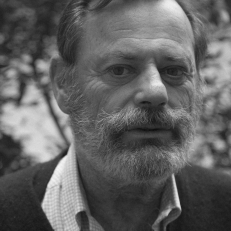
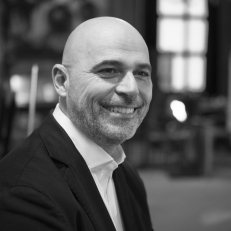
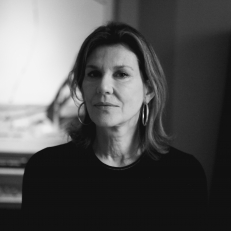
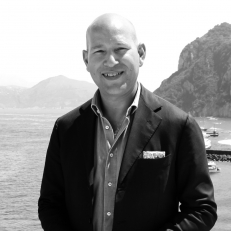
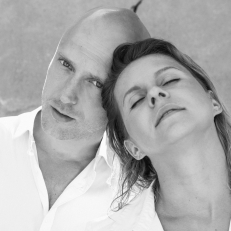
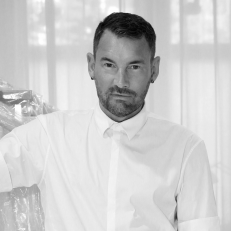
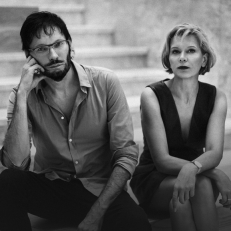
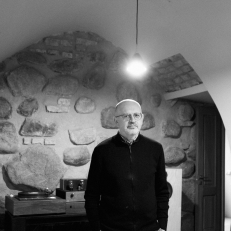
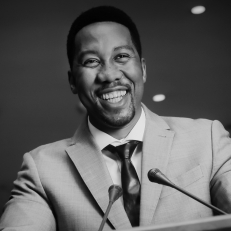
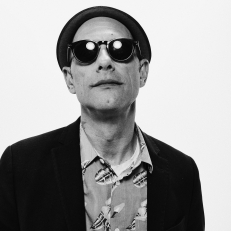


Add a comment